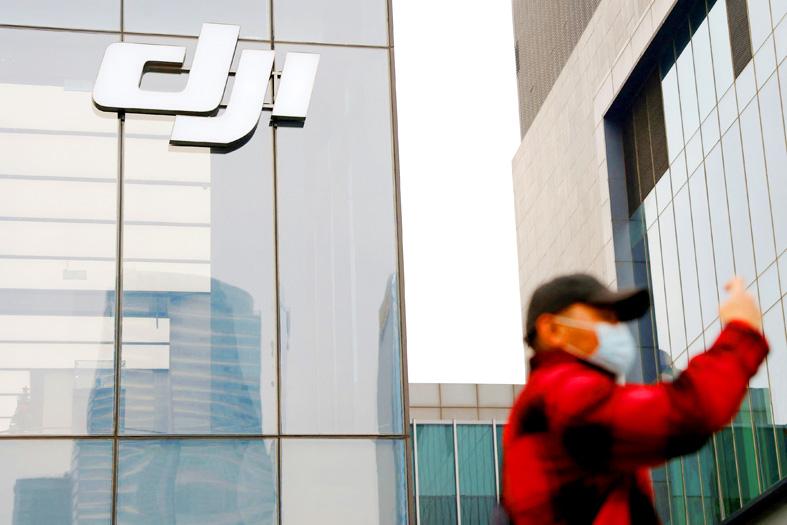Drone giant DJI Technology Co (大疆創新) said it would temporarily suspend business in Russia and Ukraine to ensure that its products are not used in combat, making it the first major Chinese firm to cite the conflict in halting sales in Russia.
Ukrainian officials and citizens have accused DJI of leaking data on the Ukrainian military to Russia, allegations the world’s largest maker of consumer and industrial drones has called “utterly false.”
In contrast with the many Western firms that have pulled out of Russia to protest its invasion of Ukraine, Chinese companies have stayed there, in line with Beijing’s stance of refraining from criticism of Moscow over the conflict.

Photo: Carlos Garcia Rawlins, Reuters
A DJI spokesperson yesterday said that its suspension of business in Russia and Ukraine was “not to make a statement about any country, but to make a statement about our principles.”
“DJI abhors any use of our drones to cause harm, and we are temporarily suspending sales in these countries to help ensure no one uses our drones in combat,” the spokesperson added.
Privately held DJI does not release financial information, but research firm Drone Analyst has estimated that it had hardware revenue of US$2.9 billion in 2020.
The conflict in Ukraine has put Chinese companies in a bind. Continuing to operate in Russia has drawn international criticism, but withdrawing would risk a backlash from the Chinese public.
In February, ride-hailing giant Didi Global Inc (滴滴) reversed a decision to leave Russia and Kazakhstan after domestic social media users accused it of succumbing to US pressure.

Sweeping policy changes under US Secretary of Health and Human Services Robert F. Kennedy Jr are having a chilling effect on vaccine makers as anti-vaccine rhetoric has turned into concrete changes in inoculation schedules and recommendations, investors and executives said. The administration of US President Donald Trump has in the past year upended vaccine recommendations, with the country last month ending its longstanding guidance that all children receive inoculations against flu, hepatitis A and other diseases. The unprecedented changes have led to diminished vaccine usage, hurt the investment case for some biotechs, and created a drag that would likely dent revenues and

Global semiconductor stocks advanced yesterday, as comments by Nvidia Corp chief executive officer Jensen Huang (黃仁勳) at Davos, Switzerland, helped reinforce investor enthusiasm for artificial intelligence (AI). Samsung Electronics Co gained as much as 5 percent to an all-time high, helping drive South Korea’s benchmark KOSPI above 5,000 for the first time. That came after the Philadelphia Semiconductor Index rose more than 3 percent to a fresh record on Wednesday, with a boost from Nvidia. The gains came amid broad risk-on trade after US President Donald Trump withdrew his threat of tariffs on some European nations over backing for Greenland. Huang further

Macronix International Co (旺宏), the world’s biggest NOR flash memory supplier, yesterday said it would spend NT$22 billion (US$699.1 million) on capacity expansion this year to increase its production of mid-to-low-density memory chips as the world’s major memorychip suppliers are phasing out the market. The company said its planned capital expenditures are about 11 times higher than the NT$1.8 billion it spent on new facilities and equipment last year. A majority of this year’s outlay would be allocated to step up capacity of multi-level cell (MLC) NAND flash memory chips, which are used in embedded multimedia cards (eMMC), a managed

CULPRITS: Factors that affected the slip included falling global crude oil prices, wait-and-see consumer attitudes due to US tariffs and a different Lunar New Year holiday schedule Taiwan’s retail sales ended a nine-year growth streak last year, slipping 0.2 percent from a year earlier as uncertainty over US tariff policies affected demand for durable goods, data released on Friday by the Ministry of Economic Affairs showed. Last year’s retail sales totaled NT$4.84 trillion (US$153.27 billion), down about NT$9.5 billion, or 0.2 percent, from 2024. Despite the decline, the figure was still the second-highest annual sales total on record. Ministry statistics department deputy head Chen Yu-fang (陳玉芳) said sales of cars, motorcycles and related products, which accounted for 17.4 percent of total retail rales last year, fell NT$68.1 billion, or